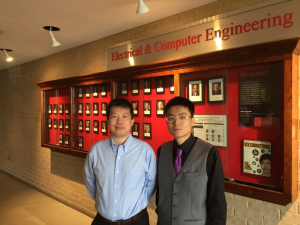Yifei Li, a former doctoral student in the Cullen College’s department of electrical and computer engineering (ECE), was garnering international attention for his battery research before he’d even earned his degree.
Li’s research on developing safer, cheaper and more efficient alternatives to traditional lithium-ion batteries was recently featured on the cover of the journal ChemNanoMat for a special issue on nanomaterials for energy conversion and storage.
In his article titled “Intercalation Pseudocapacitance of Exfoliated Molybdenum Disulfide for Ultrafast Energy Storage,” Li discusses how he and his fellow researchers – including his advisor, assistant professor of electrical and computer engineering Yan Yao – expanded the layers of a two-dimensional material to improve the performance of a supercapacitor.
“We needed to break down the material into single layers in order to approach its theoretical limit,” said Li. “By exfoliating the two dimensional material, the material delivers higher capacitance per volume due to enhanced electric conductivity.”
This research was also the focus of Li’s doctoral dissertation at the Cullen College, which received the Best Materials Program Dissertation Award from the college’s materials engineering and sciences program. Li’s dissertation will also be considered for the college-level Best Dissertation Award.
“In his dissertation, Yifei was able to pull together past research to design better materials for battery systems and because of this, we now have the ability to modify and tailor the design to the system we are trying to create,” said Yao.
Li’s dissertation, titled “Developing Beyond Lithium Ion Batteries for Electrical Energy Storage,” discusses creating safer and more efficient alternatives to lithium-ion batteries, such as sodium ion batteries, magnesium ion batteries, hybrid magnesium/sodium ion batteries and magnesium-air batteries. His dissertation reports four strategies to address the issues that often arise when utilizing big sodium ions and divalent charged magnesium ions.
Li said he felt very honored to receive this recognition from the college. “I hope that I can represent the students of our department by showing the importance of materials science and that we can make great contributions to the scientific field,” he said.
In Yao’s eyes, Li has already made great strides towards these goals.
“Yifei is the first Ph.D. student graduated in my group. He worked very hard and is very productive – he has authored 13 publications in the past four years,” said Yao. “I have seen him transform from a student to a scholar. I congratulate him on receiving the Best Dissertation Award from the materials engineering program.”
